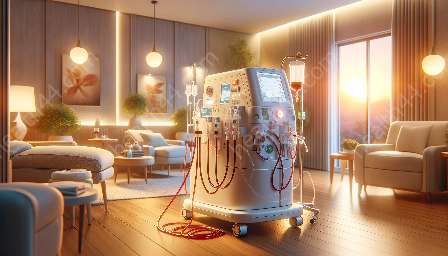When it comes to dialysis machines and medical devices & equipment, the importance of dialysis water treatment systems cannot be overstated. These systems play a crucial role in ensuring the safety and effectiveness of the dialysis process. In this comprehensive guide, we will explore the significance, working principles, components, and maintenance of dialysis water treatment systems, as well as their compatibility with dialysis machines and medical devices & equipment.
Importance of Dialysis Water Treatment Systems
Dialysis water treatment systems are specifically designed to produce high-quality water that is free from impurities and contaminants. The water used in dialysis procedures comes into direct contact with the patient's blood, making it essential to maintain stringent water quality standards. Any impurities or contaminants in the water can potentially harm the patient, leading to serious complications. Therefore, dialysis water treatment systems are vital for safeguarding the health and well-being of dialysis patients.
Working Principles of Dialysis Water Treatment Systems
These systems typically employ a combination of filtration, purification, and disinfection processes to ensure that the water meets the required purity standards. The primary aim is to remove impurities such as bacteria, endotoxins, particulates, and chemical contaminants from the water. This is achieved through various stages, including sediment filtration, activated carbon filtration, reverse osmosis, and ultraviolet (UV) disinfection.
Components of Dialysis Water Treatment Systems
A typical dialysis water treatment system consists of several key components, each serving a specific function in the water purification process. These components may include pre-filters, carbon filters, reverse osmosis membranes, UV lamps, and monitoring devices. The system is also equipped with alarms and safety features to alert healthcare providers in case of any deviations from the required water quality parameters.
Compatibility with Dialysis Machines
Dialysis water treatment systems are intricately linked to the proper functioning of dialysis machines. The water quality directly impacts the performance and accuracy of these machines, as well as the safety of the dialysis procedure. Compatibility between the water treatment system and the dialysis machine is essential to ensure seamless integration and optimal operation. The water treatment system must consistently deliver water of the required quality and quantity to support the functioning of the dialysis machine.
Compatibility with Medical Devices & Equipment
Besides dialysis machines, dialysis water treatment systems also interact with various other medical devices and equipment used in the dialysis setting. These may include hemodialyzers, blood tubing sets, and associated accessories. The water used in the preparation of dialysate, as well as for rinsing and priming these devices, must meet strict quality standards to prevent any potential harm to the patient. Therefore, the compatibility of the water treatment system with these medical devices and equipment is crucial for overall patient safety.
Maintenance of Dialysis Water Treatment Systems
Proper maintenance is paramount to ensure the continued efficacy of dialysis water treatment systems. Regular monitoring, cleaning, and validation of the system's performance are essential to uphold the water quality standards. This involves routine replacement of filters, periodic disinfection, calibration of monitoring instruments, and adherence to established maintenance protocols. Healthcare facilities must also comply with regulatory requirements and standards related to water treatment system maintenance.
Conclusion
Dialysis water treatment systems are integral components of the dialysis process, and their compatibility with dialysis machines and medical devices & equipment is crucial for delivering safe and effective care to patients. By understanding the significance, working principles, components, and maintenance of these systems, healthcare professionals can ensure the optimal functioning of dialysis water treatment systems, ultimately contributing to improved patient outcomes.


